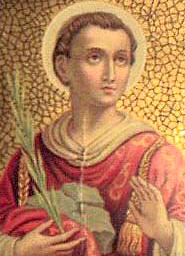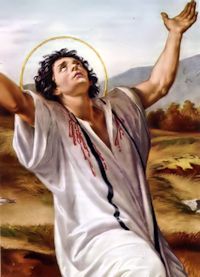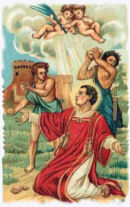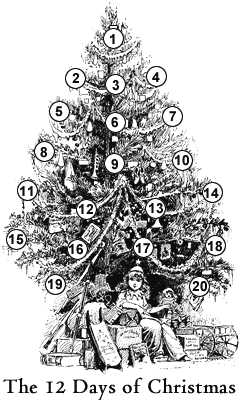
The painting is by Blessed Fra Angelico (1400-1455). Saint Peter is ordaining Stephen to the diaconate while Saint John the Beloved (whose feast we will keep tomorrow), holding his Gospel, looks on. The composition is remarkable: the three heads of Peter, John and Stephen form a triangle, a symbol of communion in the Three Divine Persons. Peter is handing over the chalice and paten; they are very large. Fra Angelico makes the Most Holy Eucharist central; he paints what Saint Thomas Aquinas taught, i.e. that the unity of the Church is constituted and held together by participation in the adorable Body and Blood of Christ.
December 26
Saint Stephen the Protomartyr
The Holy Spirit at Christmas
The liturgy of Christmas, while drawing our gaze to the Son, the Word made flesh, in no way obscures or minimizes the presence and the work of the Holy Spirit. Quite by chance, I came upon this astonishing text of Saint Ephrem the Syrian: "At this feast of the Nativity let each person wreathe the door of his heart so that the Holy Spirit may delight in that door, enter in and make there his dwelling; then by the Spirit we will be made holy."
Fear Not, For Thou Hast Found Grace With God
Already on the First Sunday of Advent, we sang in the Benedictus Antiphon, "The Holy Spirit will come upon thee, O Mary. Do not be afraid." And on the Second Saturday of Advent, Blessed Isaac of Stella explained that "what is said in the particular case of the Virgin Mother Mary, is rightly understood of the Virgin Mother Church universally (Sermon 51). Today's feast of Saint Stephen is the liturgy's way of repeating now to the Virgin Mother Church the mysterious words of the Angel Gabriel to the Virgin Mother Mary: "Fear not, for thou hast found grace with God.' (Lk 1:30).
Grace and Power
It is remarkable that Saint Luke, the author of the Acts of the Apostles, describes Saint Stephen in today's First Reading as "full of grace and power" (Ac 6:8). The phrase has a distinctively Marian resonance. To Mary, the "highly-favoured" of God (Lk 1:28), the "full of grace," the angel Gabriel says: "The Holy Ghost shall come upon thee, and the power of the most High shall overshadow thee" (Lk 1:35). The words addressed to the Virgin Mary in a particular way hold universal import for the Church.
On this second day of Christmas, Stephen, "full of grace and power"(Ac 6:8) is the radiant icon of the Church indwelt and overshadowed by the Holy Spirit. Without leaving Mary and the Infant Christ, we pass to Stephen and the Infant Christ, to Stephen and the Infant Church.
The Spirit of Truth
Saint Luke tells us that those who disputed Stephen "could not withstand the wisdom and the Spirit with which he spoke" (Ac 6:10). Stephen of the growing Church, like Jesus at the age of twelve (Lk 2:42) opens his mouth in the midst of the people, the elders, and the scribes, and his utterance is evidence of the Holy Spirit sent to the Church in fulfillment of Jesus' promises. "When the Counselor comes, whom I shall send to you from the Father, even the Spirit of Truth, who proceeds from the Father, he will bear witness to me" (Jn 15:26). Saint Matthew, in today's Gospel expresses the same reality: "Do not be anxious how you are to speak or what you are to say; for what you are to say will be given to you in that hour; for it is not you who speak, but the Spirit of your Father speaking through you" (Mt 10:19-20).
Full of the Spirit, Stephen Gazed into Heaven
We generally interpret this promise of Our Lord as having to do with the witness given by those who are delivered up to the enemies of His name and persecuted for the sake of the Gospel, and this is indeed the first meaning of the text, but the use of the text in this liturgy of Saint Stephen suggests yet another meaning to us, one that is, at a first glance, perhaps less apparent. Saint Luke clarifies his initial description of Stephen as "full of grace and power" (Ac 6:8) by making it explicit in his description of Stephen's martyrdom: "But he, full of the Holy Spirit, gazed into heaven and saw the glory of God, and Jesus standing at the right hand of God" (Ac 7:54).
"Full of grace and power" is synonymous with "full of the Holy Spirit." The effects of the indwelling and overshadowing of the Holy Spirit are that how we are to speak and what we are to say are given us by the Spirit of the Father in the hour of our need (Mt 10:19-20) and also that those who are "full of the Holy Spirit" gaze into heaven, see the glory of God, and Jesus standing at the right hand of God (Ac 7:54).
The Boldness That Comes from the Holy Spirit
The first effect corresponds to Saint Paul's experience of the indwelling Holy Spirit. "The Spirit helps us in our weakness; for we do not know how to pray as we ought, but the Spirit himself intercedes for us with sighs too deep for words" (Rom 8:26). How we are to speak and what we are to say comes from the Holy Spirit not only when we are facing persecutors but also when we, gathered in Christ, are facing the Father in prayer. In both instances the Church is in need of the parrhesia; -- the boldness -- that comes from the Spirit.
Tu Solus Sanctus
In her prayer, the Church indwelt and overshadowed by the Holy Spirit, the Church "full of grace and power" (Ac 6:8), knows how to speak and what to say, for the Spirit helps her in her weakness, giving her to pray as she ought. This is why in every festive liturgy the Church gazes into the heavens and seeing the glory of God and Jesus standing at the right hand of the Father, sings "Thou alone art the Holy One, thou alone art Lord, thou alone art the Most High: Jesus Christ, with the Holy Spirit: in the glory of God the Father" (Gloria). This is the second effect of the indwelling of the Holy Spirit. The Church-at-prayer sings what, with the eyes of faith, she beholds.
The Prayer of Christ
The work of the Holy Spirit, first of all through the sacred liturgy, is to align us with the prayer of Christ to the Father, to empty us of all that is our own prayer -- narrow, subjective, constrained -- and to fill us with the utter fullness of the prayer of Christ, a prayer that is immense, universal, all-encompassing, all-powerful and always and everywhere pleasing to the Father. In his martyrdom, Saint Stephen reveals this. "As they were stoning Stephen, he prayed, 'Lord Jesus, receive my spirit." And he knelt down and cried with a loud voice, 'Lord, do not hold this sin against them'" (Ac 7:59-60).
Designedly, Saint Luke, in his account of the death of Stephen, reproduces his own account of the prayer of the dying Jesus from the cross. "Father, forgive them; for they know not what they do," and "Father, into thy hands I commit my spirit" (Lk 23:34 and 46). There is, however, a subtle theological difference. Whereas the dying Jesus addresses the Father, the dying Stephen addresses the living Christ, the risen and ascended Jesus whom he beholds "standing at the right hand of God"(Ac 7:55). Stephen's prayer at the hour of death is a confession of the resurrection of Christ.
Under the Overshadowing of the Holy Spirit
Poised between hearing the Word of God and going to the altar for the sacrifice, the Virgin Mother Mary and the protomartyr Saint Stephen are given us as living signs of the indwelling and overshadowing of the Holy Spirit. To us is said, "The Holy Spirit will come upon you and the power of the Holy Spirit will overshadow you" (Lk 1:35). To us is given, "wisdom and the Spirit" (Ac 6:10), which no earthly power or wisdom can withstand.
Body of Christ, Voice of Christ, Prayer of Christ
By our communion in the Holy Sacrifice of Christ's Body and Blood, we, like Saint Stephen, are filled with the Holy Spirit. Herein is the transforming effect of Holy Mass: we are no longer many individuals speaking many words and praying many prayers. We are, by the action of the Holy Spirit, a single Body with a single voice and signal prayer: the Body of Christ, the voice of Christ, the prayer of Christ. Amen.





 On the day after the solemnity of Christmas, we celebrate today the feast of St. Stephen, deacon and first martyr. At first glance, to join the memory of the "protomartyr" and the birth of the Redeemer might seem surprising because of the contrast between the peace and joy of Bethlehem and the tragedy of St. Stephen, stoned in Jerusalem during the first persecution against the nascent Church.
On the day after the solemnity of Christmas, we celebrate today the feast of St. Stephen, deacon and first martyr. At first glance, to join the memory of the "protomartyr" and the birth of the Redeemer might seem surprising because of the contrast between the peace and joy of Bethlehem and the tragedy of St. Stephen, stoned in Jerusalem during the first persecution against the nascent Church. 
 Saint Stephen is the first martyr of the Church, and is the patron of stonemasons, masons, bricklayers, deacons, headaches, and horses. His story comes from the Acts of the Apostles. He is usually pictured in deacon's vestments, holding the symbol of martyrdom, a palm branch. Sometimes he has a stone in his left hand, to indicate his death by stoning. He is depicted in many images wearing a wreath, which refers to the origin of his name, the Greek word Stephanos meaning "wreath."
Saint Stephen is the first martyr of the Church, and is the patron of stonemasons, masons, bricklayers, deacons, headaches, and horses. His story comes from the Acts of the Apostles. He is usually pictured in deacon's vestments, holding the symbol of martyrdom, a palm branch. Sometimes he has a stone in his left hand, to indicate his death by stoning. He is depicted in many images wearing a wreath, which refers to the origin of his name, the Greek word Stephanos meaning "wreath." 





